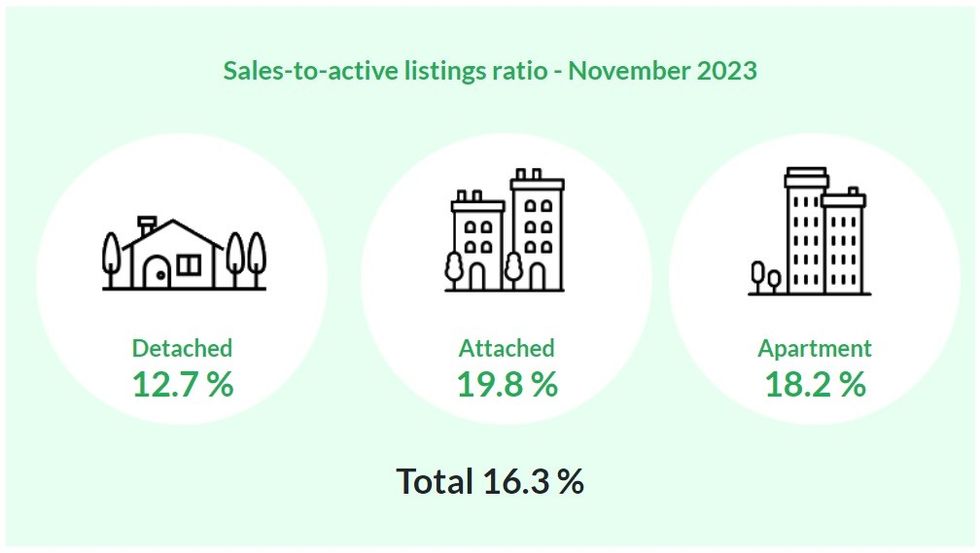Home sales in Metro Vancouver are being outpaced by listings, resulting in plenty of options for those wading into the market looking to buy, according to the Real Estate Board of Greater Vancouver (REBGV).
New statistics published on Monday revealed a recorded a total of 1,698 home sales in November, split between 532 single-detached homes, 316 townhouses, and 850 condominiums.
The November total is a decrease from the sales seen in October (1,977). It's not too far off from the November 2022 total (1,625), but is well below the 10-year average for November (2,538).
On the other side of the equation, a total of 3,369 new listings were recorded in November. Although the total fell well short of the 4,664 added in October, the November's listings were on par with the 10-year November average of 3,464.
With that new batch of listings, the number of total active listings in the Metro Vancouver region rose to 10,377, which is again on par with the 10-year November average of 10,543.
Price wise, the composite residential benchmark price in Metro Vancouver slipper to $1,185,100 — a decrease from $1,196,500 in October and $1,203,300 in September.
By residential property type, the benchmark price is now $1,982,600 for single-detached homes, $1,092,600 for townhouses, and $762,700 for condominiums. All three represent represent decreases of less than 1% from October and increases of between 6% and 7% when compared to November 2022.
Buyers Or Sellers
Using the aforementioned statistics, we can identify the sales-to-new-listings ratio and sales-to-active-listings ratio, which are two quantitative indicators that can give us a sense of whether the market is leaning in any particular direction — towards buyers or sellers.
For the sales-to-new-listings ratio, a ratio of 40% or lower is considered a buyers' market, a ratio of 55% or higher is considered to be a sellers' market, and anything in between is considered a balanced market.
With 1,698 home sales and 3,369 new listings recorded in November, the sales-to-new-listings ratio is now 50.4% after coming in at 42.4% in October, indicating that the market may be fairly balanced at the moment.
For the sales-to-active-listings ratio, a ratio of 12% or lower is viewed as favouring buyers, a ratio of 20% or higher is viewed as favouring sellers, and anything in between is viewed as a balanced market.
With 1,698 home sales and 10,377 total active listings in November, the sales-to-active-listings ratio is now 16.3%, after coming in at 17.9% in October, again indicating balance in the current market.
However, that becomes less true when looking at specific property types, where the sales-to-active-listings ratios indicate that we may be closer to a buyers' market for single-detached homes (12.7%) and a sellers' market for both townhouses (19.8%) and condos (18.2%).

Analysis And Outlook
"We've been watching the number of active listings in our market increase over the past few months, which is giving buyers more to choose from than they've been used to seeing over the past few years," says REBGV's Director of Economics and Data Analytics Andrew Lis. "When paired with the seasonal slowdown in sales we typically see this time of year, this increase in supply is creating balanced conditions across Metro Vancouver's housing market."
Lis adds that balanced conditions typically result in flatter price trends, which is what the market has seen since this summer, after prices rose steadily in the first half of this year.
"You probably won't find Cyber Monday discounts, but prices have edged lower by a few percent since the summer," adds Lis. "And with most economists expecting mortgage rates to fall modestly in 2024, market conditions for buyers are arguably the most favorable we've seen in some time in our market."
The Bank of Canada is set to make its next policy interest rate announcement on Wednesday, December 6, and many are expecting the Bank to hold the rate at 5%. In a forecast published in late-October, the BC Real Estate Association says it is expecting rate decreases to begin in the first half of 2024, after which the market could see a strong rebound.





















